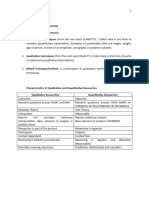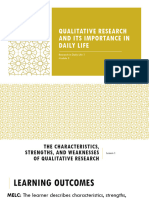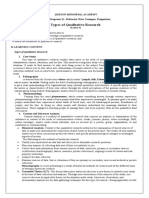0 ratings0% found this document useful (0 votes)
39 viewsWeek 2 PR 1
Week 2 PR 1
Uploaded by
Anime Tuko Here is a 10 sentence reflection on the importance of qualitative research:
Qualitative research allows us to gain an in-depth understanding of human behaviors, perceptions and experiences. It provides rich insights into how people feel about certain issues and why they think or act in certain ways. Qualitative data in the form of words, images and descriptions help reveal subtleties and nuances that quantitative data cannot capture. This type of research is especially useful for exploring new topics where little is known. The flexible nature of qualitative methods enables researchers to adapt their approach as new discoveries are made. Findings from qualitative studies can help develop theories to understand social phenomena. It is highly valuable for learning about people's individual perspectives and the complex realities of their lives. The
Copyright:
© All Rights Reserved
Available Formats
Download as PPTX, PDF, TXT or read online from Scribd
Week 2 PR 1
Week 2 PR 1
Uploaded by
Anime Tuko0 ratings0% found this document useful (0 votes)
39 views32 pages Here is a 10 sentence reflection on the importance of qualitative research:
Qualitative research allows us to gain an in-depth understanding of human behaviors, perceptions and experiences. It provides rich insights into how people feel about certain issues and why they think or act in certain ways. Qualitative data in the form of words, images and descriptions help reveal subtleties and nuances that quantitative data cannot capture. This type of research is especially useful for exploring new topics where little is known. The flexible nature of qualitative methods enables researchers to adapt their approach as new discoveries are made. Findings from qualitative studies can help develop theories to understand social phenomena. It is highly valuable for learning about people's individual perspectives and the complex realities of their lives. The
Original Description:
Pr
Original Title
Week-2-PR-1
Copyright
© © All Rights Reserved
Available Formats
PPTX, PDF, TXT or read online from Scribd
Share this document
Did you find this document useful?
Is this content inappropriate?
Here is a 10 sentence reflection on the importance of qualitative research:
Qualitative research allows us to gain an in-depth understanding of human behaviors, perceptions and experiences. It provides rich insights into how people feel about certain issues and why they think or act in certain ways. Qualitative data in the form of words, images and descriptions help reveal subtleties and nuances that quantitative data cannot capture. This type of research is especially useful for exploring new topics where little is known. The flexible nature of qualitative methods enables researchers to adapt their approach as new discoveries are made. Findings from qualitative studies can help develop theories to understand social phenomena. It is highly valuable for learning about people's individual perspectives and the complex realities of their lives. The
Copyright:
© All Rights Reserved
Available Formats
Download as PPTX, PDF, TXT or read online from Scribd
Download as pptx, pdf, or txt
0 ratings0% found this document useful (0 votes)
39 views32 pagesWeek 2 PR 1
Week 2 PR 1
Uploaded by
Anime Tuko Here is a 10 sentence reflection on the importance of qualitative research:
Qualitative research allows us to gain an in-depth understanding of human behaviors, perceptions and experiences. It provides rich insights into how people feel about certain issues and why they think or act in certain ways. Qualitative data in the form of words, images and descriptions help reveal subtleties and nuances that quantitative data cannot capture. This type of research is especially useful for exploring new topics where little is known. The flexible nature of qualitative methods enables researchers to adapt their approach as new discoveries are made. Findings from qualitative studies can help develop theories to understand social phenomena. It is highly valuable for learning about people's individual perspectives and the complex realities of their lives. The
Copyright:
© All Rights Reserved
Available Formats
Download as PPTX, PDF, TXT or read online from Scribd
Download as pptx, pdf, or txt
You are on page 1of 32
PRACTICAL RESEARCH 1
Qualitative Research and Its Importance in Daily Life
Lord, help us in our work today
give us concentration so that
may we listen, understand, learn
and have a peaceful mind and
may we always remember that
Jesus Christ is always with us.
Amen..
The students are expected to be able to:
1.describe the characteristics of qualitative research ,
its strengths and weaknesses;
2. identify the types of qualitative researches; and
3. explain how qualitative research facilitate finding
solutions to real life problem, develop critical thinking
and good decision-making skills
RESEARCH
According to Coghan 2014, there is a personal
involvement in every stage of your research. According
to Silverman 2013; Litchman 2013;
Walliman 2014; Suter 2012, qualitative research is an act
of inquiry or investigation of real-life events.
TYPES OF
QUALITATIVE
RESEARCH
Types of Qualitative Research
1. Phenomenology. Coming from the word “phenomenon,” which
means something known through sensory experience. It refers to
the study of how people find their experiences meaningful. Its
primary goal is to make people understand their experiences.
2. Ethnography. It is the study of a particular cultural group to get a
clear understanding of its organizational set-up, internal operation
and lifestyle.
Types of Qualitative Research
3. Grounded theory. It is a development of theory directly based and
grounded in the data collected by the researcher. It is a research
methodology for discovering theory in a substantive area. It takes place
when you discover a new theory to underlie your study at the time of data
collection and analysis.
4. Case study. This involves a long time study of a person, group,
organization, or situation. It seeks to find answers to why such thing occurs
to the subject. Varieties of data collection methods such as interviews,
questionnaires, observations and documentary analysis are used.
Types of Qualitative Research
3. Grounded theory. It is a development of theory directly based and
grounded in the data collected by the researcher. It is a research
methodology for discovering theory in a substantive area. It takes place
when you discover a new theory to underlie your study at the time of data
collection and analysis.
4. Case study. This involves a long time study of a person, group,
organization, or situation. It seeks to find answers to why such thing occurs
to the subject. Varieties of data collection methods such as interviews,
questionnaires, observations and documentary analysis are used.
Major
Characteristic
s of
Qualitative
Research
Major Characteristics of Qualitative Research
Naturalistic inquiry. Studying real-world situations as they unfold
naturally; nonmanipulative, unobtrusive, and non-controlling; openness
to whatever emerges—lack of predetermined constraints on outcomes.
Inductive analysis. Immersion in the details and specifics
of the data to discover important categories, dimensions,
and interrelationships; begin by exploring genuinely open
questions rather than testing theoretically derived
(deductive) hypotheses.
Major Characteristics of Qualitative Research
Holistic perspective. The whole phenomenon under study is understood
as a complex system that is more than the sum of its parts; focus is on
complex interdependencies not meaningfully reduced to a few discrete
variables and linear, cause-effect relationships.
Qualitative data. Detailed, thick description; inquiry in
depth; direct quotations capturing people‘s personal
perspectives and experiences.
Major Characteristics of Qualitative Research
Personal contact and insight. The researcher has direct contact with
and gets close to the people, situation, and phenomenon under study;
researcher‘s personal experiences and insights are important part of the
inquiry and critical to understanding the phenomenon.
Dynamic systems. Attention to process; assumes
change is constant and ongoing whether the focus is
on an individual or an entire culture.
Major Characteristics of Qualitative Research
Unique case orientation. Assumes each case is special and unique; the
first level of inquiry is being true to, respecting, and capturing The
details of the individual cases being studied; cross case analysis follows
from and depends on the quality of individual case studies.
Context sensitivity. Places findings in a social, historical,
and temporal context; doubtful of the possibility or
meaningfulness of generalization across time and space.
Major Characteristics of Qualitative Research
Emphatic neutrality. Complete objectivity is impossible; pure
subjectivity undermines credibility; the researcher‘s passion is
understanding the world in all its complexity – not proving something,
not advocating, not advancing personal agenda, but understanding;
the researcher includes personal experience and empathic insight
as part of the relevant data, while taking a neutral nonjudgmental
stance toward whatever content may emerge.
Major Characteristics of Qualitative Research
Design flexibility. Open to adapting inquiry as
understanding deepens and/or situations change; avoids
getting locked into rigid designs that eliminate
responsiveness; pursues new paths of discovery as they
emerge.
Strengths of
Qualitative
Research
1. Issues can be examined in detail and in
depth.
2. Interviews are not restricted to specific
questions and can be guided/redirected by
the researcher in real time.
STRENGTHS
3. The research framework and direction can
be quickly revised as new information
emerges
4. The obtained data based on human
experience is powerful and sometimes more
compelling than quantitative data.
5. Subtleties and complexities about the research subjects
and/or topic are discovered that are often missed by more
positivistic inquiries.
STRENGTHS 6. Data usually are collected from a few cases or individuals
so findings cannot be generalized to a larger population.
Findings can however be transferable to another setting.
Limitations of
Qualitative
Research
1. Research quality is heavily dependent on the individual
skills of the researcher and more easily influenced by the
researcher's personal biases and idiosyncrasies.
2. Rigor is more difficult to maintain, assess, and
demonstrate.
3. The volume of data makes analysis and interpretation
time consuming.
4. It is sometimes not as well understood and accepted as
LIMITATIONS quantitative research within the scientific community
5. The researcher's presence during data gathering, which
is often unavoidable in qualitative research, can affect the
subjects' responses.
6. Issues of anonymity and confidentiality can
bring/result to problems when presenting findings
7. Findings can be more difficult and time consuming to
characterize in a visual way.
Importance
of
qualitative
research
across fields
Qualitative research is a growing field of
inquiry that cuts across disciplines and
subject matter. it subsumes a range of
Importance of perspectives, paradigms and methods and
qualitative within each epistemological theory,
research across qualitative research can mean different
fields things. Qualitative research provides
valuable data for use in the design
product-including data about user needs,
behavior patterns, and use cases.
Qualitative research is very important in
educational research as it addresses the “how”
Importance of and “why” research questions and enables
qualitative deeper understanding of experiences,
research across phenomena and context. Qualitative research
allows you to ask questions that cannot be
fields easily put into numbers to understand human
experience.
Importance of Qualitative is important in arts since with the
qualitative use of this research people could be able to
reach new ideas and conclusions which will help
research across people improve arts and discover new
fields techniques and any other more.
It provides an in-depth understanding of the
Importance of ways people come to understand, act and
qualitative manage their day-to-day situations in particular
settings. ... Qualitative research uses words and
research across images to help us understand more about
fields “why” and “how” something is happening (and,
sometimes “what” is happening).
It provides an in-depth understanding of the
Qualitative researchers in the field of music
Importance of education interact with research participants
qualitative and perform data collection in a variety of
research across settings and formats. The ethical conduct of
research is paramount in all circumstances, but
fields the nature of external regulatory oversight
varies with the research design.
In the field of Humanities, researchers ought to
Importance of focus not to man’s social life but instead studies
qualitative it’s meanings, significance & visualizations of
research across man’s experiences in the field of Fine Arts,
Literature, Music, Drama, Dance & other
fields artistically inclined subjects.
Task #1 p. 14
Write a 10 sentences reflection on the importance of
qualitative research in your own field of specialization by
identifying real life problems and explain how does
qualitative research will help you in solving these problems
Assimilation pages 15-16
Read the research article below.
Improving patient care as the use of telemedicine rises
A new app, developed by Abbott’s UK-based nutrition business, has already seen more
than 2,500 healthcare professionals screen their patients simply and remotely for
malnutrition, muscle mass and function loss.
Answer the following questions:
1. What type of qualitative research is this? Support your answer.
2. Describe this research in terms of its characteristics, its strengths and limitations
Assessment page 17
Answer test I and test II.
You might also like
- Spinors and Space-Time, Volume 1 - Two-Spinor Calculus and Relativistic Fields - PDF RoomDocument469 pagesSpinors and Space-Time, Volume 1 - Two-Spinor Calculus and Relativistic Fields - PDF RoomQazi MusharafNo ratings yet
- Final Copy LM Dressmaking 18 MB PDFDocument321 pagesFinal Copy LM Dressmaking 18 MB PDFLizette Ann90% (77)
- Doosan PP 05012018050221 143 46720686 PDFDocument90 pagesDoosan PP 05012018050221 143 46720686 PDFAnonymous ZtXb2RONo ratings yet
- The Beginning of BusinessDocument8 pagesThe Beginning of BusinessZaini XhNo ratings yet
- Catalogo de Partes PDFDocument2,955 pagesCatalogo de Partes PDFpedro corrales100% (3)
- F2018136003Document1 pageF2018136003simmalik10% (1)
- Characteristics, Processes, Advantage and Disadvantage of Qualitative ResearchDocument19 pagesCharacteristics, Processes, Advantage and Disadvantage of Qualitative ResearchSherylNo ratings yet
- Characteristics and Types of Qualitative ResearchDocument2 pagesCharacteristics and Types of Qualitative ResearchMark Vincent Fernandez100% (11)
- Describes Characteristics, Strengths, Weaknesses, and Kinds of Qualitative ResearchDocument29 pagesDescribes Characteristics, Strengths, Weaknesses, and Kinds of Qualitative ResearchBabes Gonz100% (1)
- PR 1 Day 6Document55 pagesPR 1 Day 6clemenakhairayeshaNo ratings yet
- (WCC) PR1 - Lesson 2Document31 pages(WCC) PR1 - Lesson 2Jhazz DanaoNo ratings yet
- PR1 Week 3Document50 pagesPR1 Week 3Cabrillas Roseann JoyNo ratings yet
- Qualitative Presentation Kel. 1 FIX FINALDocument18 pagesQualitative Presentation Kel. 1 FIX FINALSintia Devimaharani123No ratings yet
- Qualitative ResearchDocument20 pagesQualitative Researchvinruizal1No ratings yet
- Types S WDocument20 pagesTypes S Wjoanadufale339No ratings yet
- NOTES.MODULE-3.A-CLOSER-LOOK-ON-QUALITATIVE-RESEARCHDocument3 pagesNOTES.MODULE-3.A-CLOSER-LOOK-ON-QUALITATIVE-RESEARCHDuran CjNo ratings yet
- Quantitative and Qualitative ResearchDocument30 pagesQuantitative and Qualitative ResearchJessaNo ratings yet
- Group 2 Qualitative StudyDocument18 pagesGroup 2 Qualitative StudyKyla RoceroNo ratings yet
- Module 2 and 3 Qualitative Research and Its Importance in Daily LifeDocument24 pagesModule 2 and 3 Qualitative Research and Its Importance in Daily LifeDearla Bitoon100% (1)
- Reviewer LectureDocument2 pagesReviewer LecturejnlynxxpnepomucenoNo ratings yet
- Modules 2and3Document48 pagesModules 2and3Michael MangahasNo ratings yet
- PR1 - Unit 2 NotesDocument6 pagesPR1 - Unit 2 NotesBluvrNo ratings yet
- Week 2 q3Document16 pagesWeek 2 q3catherine saldeviaNo ratings yet
- Unit 3 Qualitative MethodsDocument28 pagesUnit 3 Qualitative Methodsphoenix212002No ratings yet
- PR1 ModuleDocument17 pagesPR1 ModuleNiña Calara100% (1)
- Characteristics of Quali ResearchDocument14 pagesCharacteristics of Quali ResearchMiracle SalvadorNo ratings yet
- Practical Research I Q3 Module 2Document24 pagesPractical Research I Q3 Module 2Janine MagnayeNo ratings yet
- First Quarter Module 1 3Document11 pagesFirst Quarter Module 1 3Prince Kobe CalaloNo ratings yet
- Lesson 5 - The Value of Qualitative Research Its Characteristics Strengths Weaknesses and KindsDocument31 pagesLesson 5 - The Value of Qualitative Research Its Characteristics Strengths Weaknesses and KindsMitze QuinonesNo ratings yet
- PR1 Lesson 3Document7 pagesPR1 Lesson 3Ruel AcostaNo ratings yet
- Reading Material For Topic 1 - The Nature and Characteristics of Research PDFDocument9 pagesReading Material For Topic 1 - The Nature and Characteristics of Research PDFAlyanna Clarisse Padilla CamposNo ratings yet
- Pr1 ReviewerDocument19 pagesPr1 ReviewerLuke Pinon HornillaNo ratings yet
- Major Characteristics of Qualitative ResearchDocument16 pagesMajor Characteristics of Qualitative ResearchJam Gumanoy NavarroNo ratings yet
- RSCH 1Document72 pagesRSCH 1Yssa SayconNo ratings yet
- What Is Qualitative ResearchDocument4 pagesWhat Is Qualitative ResearchNida HammadNo ratings yet
- Week2Q3 LAS PracticalResearch1 FinalDocument8 pagesWeek2Q3 LAS PracticalResearch1 FinalLaurice GomezNo ratings yet
- Module 2. Research Techniques N Methods Feb 8 9Document5 pagesModule 2. Research Techniques N Methods Feb 8 9theresabalagata03No ratings yet
- PR1 Hand Out No. 2Document3 pagesPR1 Hand Out No. 2kyyzelleezapantaaNo ratings yet
- Lesson 2 - Qualitative Research and Its Importance in Daily LifeDocument22 pagesLesson 2 - Qualitative Research and Its Importance in Daily LifeNOLI TAMBAOANNo ratings yet
- Practical Research ReportDocument43 pagesPractical Research ReportJanela RealtoNo ratings yet
- Practical Research 2.3Document8 pagesPractical Research 2.3Michael GabertanNo ratings yet
- Ethics in ResearchDocument6 pagesEthics in ResearchGlad FeriaNo ratings yet
- Lesson 4 Qualitative ResearchDocument14 pagesLesson 4 Qualitative Researchelasanchez507No ratings yet
- DM - RDL 1 - Module 3Document17 pagesDM - RDL 1 - Module 3Mark100% (1)
- Midtern PR 1Document20 pagesMidtern PR 1Kristina PabloNo ratings yet
- Characteristics of Qualitative ResearchDocument5 pagesCharacteristics of Qualitative Researchshabnam100% (1)
- Qualitative ResearchDocument19 pagesQualitative ResearchAllen Mathew HulipasNo ratings yet
- 10 Distinctive Qualities of QualitativeDocument1 page10 Distinctive Qualities of QualitativeLeigh Yah100% (1)
- RDL Module 3Document45 pagesRDL Module 3vea7007No ratings yet
- Descriptive ResearchDocument5 pagesDescriptive ResearchHarlyn GayomaNo ratings yet
- Practical-Research1 Q3 Week2Document8 pagesPractical-Research1 Q3 Week2Stephanie GocelaNo ratings yet
- PracticalResearch1 q3 Week2 v4Document12 pagesPracticalResearch1 q3 Week2 v4Shekaina Faith Cuizon LozadaNo ratings yet
- App-005 Practical Research 111Document7 pagesApp-005 Practical Research 111Armhay Loraine DuavezNo ratings yet
- Lesson 4 Types of Qualitative ResearchDocument2 pagesLesson 4 Types of Qualitative ResearchYhel LantionNo ratings yet
- Nature of Qualitative Research ParcticalDocument7 pagesNature of Qualitative Research ParcticalJulia FlorencioNo ratings yet
- Practical Research 1 SlideshowDocument96 pagesPractical Research 1 SlideshowGresel GabawanNo ratings yet
- Q3 Prac1 Lecture Lesson3Document2 pagesQ3 Prac1 Lecture Lesson3Synd WpNo ratings yet
- Methods of Research ReviewerDocument6 pagesMethods of Research ReviewerRicky RixNo ratings yet
- Kinds of Research Across FieldsDocument25 pagesKinds of Research Across Fieldskringkrong eysNo ratings yet
- Hinges - Google SearchDocument1 pageHinges - Google SearchMaxwell DavorNo ratings yet
- Lesson 3 Qualitative ResearchDocument2 pagesLesson 3 Qualitative ResearchYhel LantionNo ratings yet
- Qualitative-Research-Unveiling-the-Depth-of-UnderstandingDocument10 pagesQualitative-Research-Unveiling-the-Depth-of-UnderstandingMarry Jane MontillianaNo ratings yet
- 3. QualitativeResearch_YT-9 -TDocument50 pages3. QualitativeResearch_YT-9 -TRatnaNo ratings yet
- Research Methods and Methods in Context Revision Notes for AS Level and A Level Sociology, AQA FocusFrom EverandResearch Methods and Methods in Context Revision Notes for AS Level and A Level Sociology, AQA FocusNo ratings yet
- Card Encoder PG-X3Document28 pagesCard Encoder PG-X3davidtee8386No ratings yet
- Essential Qualification ExperienceDocument7 pagesEssential Qualification ExperiencevasanthanilNo ratings yet
- YogaDocument4 pagesYogaAmbar PurohitNo ratings yet
- EM MultiV5 LGRED OutdoorUnits PDFDocument95 pagesEM MultiV5 LGRED OutdoorUnits PDFenlightened1718No ratings yet
- Ulysses by James Joyce (Project Gutenberg)Document354 pagesUlysses by James Joyce (Project Gutenberg)Ragini MMS 69No ratings yet
- HTML 6 Frames PDFDocument11 pagesHTML 6 Frames PDFSharkLaserNo ratings yet
- Microbial Energy Production by PhotosynthesisDocument23 pagesMicrobial Energy Production by PhotosynthesisSNNNo ratings yet
- COMPANY PROFILE PT AISYAH CAHAYA NUSANTARA Aisyahcahaya NusantaraDocument15 pagesCOMPANY PROFILE PT AISYAH CAHAYA NUSANTARA Aisyahcahaya NusantaraMd Robin HossainNo ratings yet
- Kamala DasDocument8 pagesKamala DaspankajkurilNo ratings yet
- Fybba Syllabus Nep 2020 Ay 2023-2024 (F)Document63 pagesFybba Syllabus Nep 2020 Ay 2023-2024 (F)Vishal SuryawanshiNo ratings yet
- Pocket Guide to Critical Care Pharmacotherapy, 2e SÁCH DỊCHDocument185 pagesPocket Guide to Critical Care Pharmacotherapy, 2e SÁCH DỊCHHoàng LongNo ratings yet
- BBU3900 UTRP Description1Document13 pagesBBU3900 UTRP Description1thksiNo ratings yet
- Elphos Erald: Resident Concerned About Dirty DozenDocument12 pagesElphos Erald: Resident Concerned About Dirty DozenThe Delphos HeraldNo ratings yet
- Kaveri HaritasDocument23 pagesKaveri HaritasSameer Surla ce21b112No ratings yet
- Self (Ie) PerceptionDocument81 pagesSelf (Ie) PerceptionCasey Federbusch100% (1)
- Major Findings:: Sure That Their Needs Are Taken Care of Before Yours."Document4 pagesMajor Findings:: Sure That Their Needs Are Taken Care of Before Yours."Janardan SubediNo ratings yet
- Opposite Colored Bishops in The MiddlegameDocument11 pagesOpposite Colored Bishops in The MiddlegameVon Greggy Moloboco IINo ratings yet
- Geophysical Study of Ada Tepe Occurrence in Eastern RhodopesDocument9 pagesGeophysical Study of Ada Tepe Occurrence in Eastern Rhodopesdely susantoNo ratings yet
- Effects of Video GamesDocument10 pagesEffects of Video GamesAli, S. M. FurkanNo ratings yet
- Tutor Feedback English Analytical EssayDocument6 pagesTutor Feedback English Analytical Essaycompanyrufus36No ratings yet
- 4-Machine Layout+Target+SMV (Means Sweat Shirt)Document1 page4-Machine Layout+Target+SMV (Means Sweat Shirt)masudul alam sajibNo ratings yet
- Tanguleranderten UtilisationofspentbrewersyeastDocument6 pagesTanguleranderten UtilisationofspentbrewersyeastIgacici ŠefNo ratings yet
- Life Sciences Grade 12 Informal Test GeneticsDocument4 pagesLife Sciences Grade 12 Informal Test GeneticsTonyy MichNo ratings yet
- Hole FinderDocument1 pageHole FinderSLK SPVNo ratings yet

























































































